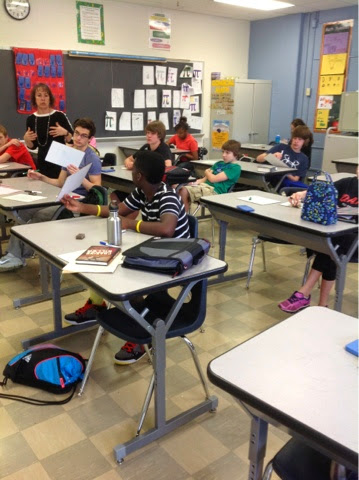You all know how I feel about "MAP Prep," but if you can't remember, let me remind you: if we have relevant and rigorous instruction (+ a little fun) all year, we are prepared. There is no specific need to review for state testing.
So, in the spirit of "MAP Prep" is bad, I'd like to point out some good old instruction that while supporting upcoming testing also reflects best practices in instruction:
1) Group Work: Getting kids to dialogue about their learning is an excellent way for them to retain understanding. In the pictures below, notice how engaged students are in the "Book Clubs."
3) Formative assessment to keep kids engaged and provide intervention: Below, you will notice the use of white boards to ensure students are thinking about mathematical problems and determining a solution. It is noteworthy that eValuate data helped the teacher determine areas of remediation for the class.
4) Building Vocabulary: Student comprehension is contingent on their understanding of words. Whether they build understanding through inferring word meaning or by practicing use of vocabulary, it's an essential element of reading comprehension. I can't help but wonder, "Do we even use those MAP Words of the Day? Are they effective? Do we need to revisit those?"
5) Kids Teaching Kids: Let's face it, we are all an expert in something and when we get to demonstrate our expertise, we cement what we already knew, enhancing that expertise. Here, kids are reviewing math concepts from eValuate by teaching one another how they did it.
7) Thinking Abstractly about Concrete Learning: Ask your self, "What kind of triangle would I be and why?" In this class, students demonstrated their understanding of the types of triangles by justifying how they fit their personality. All I can say is that I'm an equilateral triangle - can anyone guess why? (Not you, Ms. Frank and Miss Scott).












No comments:
Post a Comment